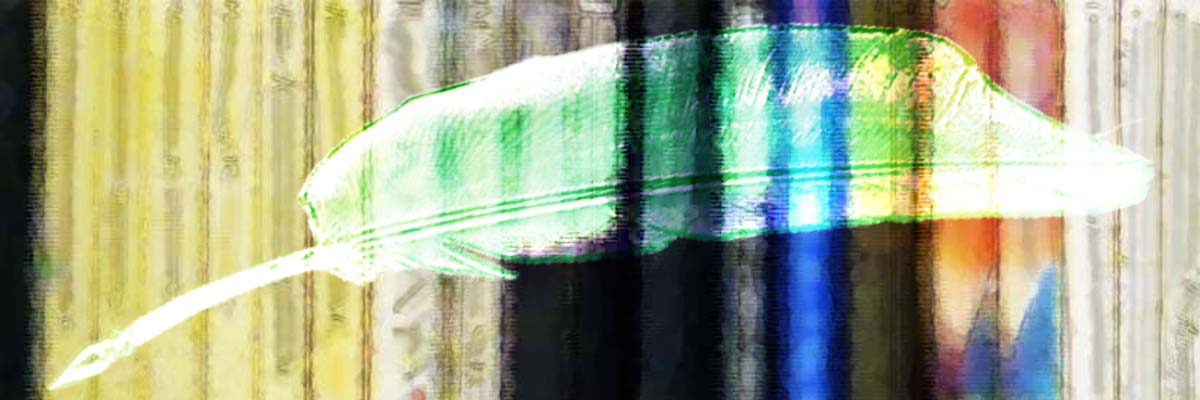Over the last seven days, following my last entry for Blogg52, I’ve run a bibliophile’s — a book lover’s — questionnaire. One question a day here At the Quill, and on Facebook and Twitter. I come out of the experience with a slightly increased respect for all those people who create “click bait” questionnaires on the social networks. It’s not quite as easy as it looks. (Which isn’t to excuse the poverty of effort put into some of those Facebook questionnaires.) Anyway, having got to the end of my seven days it seems appropriate to sum things up.
 First of all I should thank all the people who took time out of their days to respond to some or all of my questions. Thank you Agneta, Aleks, Anna, Eva, Kate, Lena, Miranda, Monica, Pernilla and Silia. The overall average of your response suggests you are all delightful, well-balanced people who are nevertheless passionate about books. Not an entirely surprising result.
First of all I should thank all the people who took time out of their days to respond to some or all of my questions. Thank you Agneta, Aleks, Anna, Eva, Kate, Lena, Miranda, Monica, Pernilla and Silia. The overall average of your response suggests you are all delightful, well-balanced people who are nevertheless passionate about books. Not an entirely surprising result.
If your responses say something about how you feel about books, the questions — and the way the alternative answers were formulated — gave you pointers towards my feelings. To be sure, I was trying to be light-hearted, but I think there are undercurrents.
I tried to strike a balance between questions about the physical object and the content of books. For good or ill, I am still wedded to the book as a collection of printed pages bound up between covers. It seems all of you are too.
Not Dolores Umbridge
 My first question had to do with books on shelves – the space available, the decorative quality, the dust trap they constitute, the challenge from the e-reader. “You sit in your sofa and look at your shelves and think…” No one chose E, my fifth alternative response: “Now all my books are on my e-reader I have much more space for my collection of porcelain plates with pictures of kittens.” Because, after all, you’re book lovers – not Dolores Umbridge. The results here were 7 As, 8 Bs, 1 C, 2 Ds. What I didn’t do was identify the sense in which people looking at their shelves were thinking: “So many books, and so many I’ve not yet read” (B). I hope it was an expression of delight and anticipation.
My first question had to do with books on shelves – the space available, the decorative quality, the dust trap they constitute, the challenge from the e-reader. “You sit in your sofa and look at your shelves and think…” No one chose E, my fifth alternative response: “Now all my books are on my e-reader I have much more space for my collection of porcelain plates with pictures of kittens.” Because, after all, you’re book lovers – not Dolores Umbridge. The results here were 7 As, 8 Bs, 1 C, 2 Ds. What I didn’t do was identify the sense in which people looking at their shelves were thinking: “So many books, and so many I’ve not yet read” (B). I hope it was an expression of delight and anticipation.
The second question was to do with giving away books you have enjoyed. It seems we’ve all done it and that none of us are unaffected. I clearly share the experience of waking in the middle of the night crying “Oh, no! What have I done?” And going on-line to replace the books I’ve given away. However none of you seem to have sunk to the level – as I have – of going to the charity shop and trying to buy back the books you’ve given them. (I didn’t succeed – someone else was ahead of me.)
Reading in public
 Question 3, on Friday, had to do with our reactions when we see people reading books on public transport. Six out of seven of us find ourselves trying to identify the book by squinting at the cover or casually leaning over the reader’s shoulder. The seventh, it seems, is happy to actually ask, “What are you reading?” And strike up a conversation. In reply to some comments on Facebook I reminisced about my photography. For a period of time I was taking photographs of people reading books in public . Then I saw a cartoon in our local paper in Gothenburg. A man reading a book on a park bench was surrounded by people taking photographs of him with their mobile phones. I decided my photographing of readers was a cliché, and stopped.
Question 3, on Friday, had to do with our reactions when we see people reading books on public transport. Six out of seven of us find ourselves trying to identify the book by squinting at the cover or casually leaning over the reader’s shoulder. The seventh, it seems, is happy to actually ask, “What are you reading?” And strike up a conversation. In reply to some comments on Facebook I reminisced about my photography. For a period of time I was taking photographs of people reading books in public . Then I saw a cartoon in our local paper in Gothenburg. A man reading a book on a park bench was surrounded by people taking photographs of him with their mobile phones. I decided my photographing of readers was a cliché, and stopped.
Burned and buried
 Question 4 was the question I feel most viscerally about. “You are watching a film and a scene comes up in which books are burned, torn, drowned or thrown. What do you do?” I was a little disappointed that only four people responded, but perhaps that’s indicative of something in itself. (Okay, it might just be indicative of a lack of time on a Saturday for silly questionnaires.) When I wrote this question I was thinking exclusively of my reaction to seeing physical books damaged or destroyed. (“Wince, shudder; Cry out.”) Some of the responses reminded me that another perspective is to think about what the books contain and what reasons may be given for the destruction. This was the question I had not thought through as thoroughly as I might.
Question 4 was the question I feel most viscerally about. “You are watching a film and a scene comes up in which books are burned, torn, drowned or thrown. What do you do?” I was a little disappointed that only four people responded, but perhaps that’s indicative of something in itself. (Okay, it might just be indicative of a lack of time on a Saturday for silly questionnaires.) When I wrote this question I was thinking exclusively of my reaction to seeing physical books damaged or destroyed. (“Wince, shudder; Cry out.”) Some of the responses reminded me that another perspective is to think about what the books contain and what reasons may be given for the destruction. This was the question I had not thought through as thoroughly as I might.
However, I still feel that physical books have a value that may be greater than their contents. Is this rational? I’m just now thinking of a scene in the TV series Homeland. Brody, the putative terrorist and traitor, lovingly wraps and then buries his copy of the Koran after his wife has thrown it on the oily floor of his garage. On the one hand this feels emotionally appropriate. The book has been damaged, is dead, and should be buried with respect. On the other hand, burying a book puts it as completely beyond use as burning it, so how is it better?
The fifty twilights of Katniss Potter
 Question 5 came on Sunday. This one was about book series for young people that have become film series. I think I may have inadvertently skewed part of the response here since one of the series I chose to mention was the Fifty Shades series by EL James. Here’s what I was thinking.
Question 5 came on Sunday. This one was about book series for young people that have become film series. I think I may have inadvertently skewed part of the response here since one of the series I chose to mention was the Fifty Shades series by EL James. Here’s what I was thinking.
JK Rowling’s Harry Potter series (1997-2007) sparked a phenomenal interest in reading among a generation of young people. For all the criticism the series received from the literary establishment (the likes of Harold Bloom – “Harry Potter is stupid crap”), both children and teachers were delighted with the series though for different reasons. The children loved the stories and the characters. The teachers said “It’s fantastic how this series has caught young people’s attention and introduced them to the delights of reading.” (Which was also the most popular option in my quiz.)
Harry Potter started out as a series for older children, but grew over the seven episodes to become a Young Adult series, taking up some darker themes not usually seen in books for a younger audience. Susanna Collins’ Hunger Games series (2008-2010) and Stephanie Meyer’s Twilight series (2005-2008) were both aimed at a Young Adult/New Adult audience. Although both certainly developed their own unique readership, it seems to me that they may well have benefited from the success of Harry Potter. Perhaps inherited some of that series’ readers as they grew older and started looking for more books that spoke to an adolescent’s spirit of enquiry or resistance, filled the sense-of-wonder/fantasy void and/or confronted awakening sexuality.
Rose-coloured BDSM
 How does Fifty Shades (2011-2012) fit into this context? Well, it started life as amateur fiction created within Twilight’s fan base. For all its trappings of explicit sex and rose-coloured BDSM it is a romantic fantasy. I can appreciate that enthusiasts for Potter or Catniss are uncomfortable finding their favourites yoked to what is effectively soft porn, but I think the link holds.
How does Fifty Shades (2011-2012) fit into this context? Well, it started life as amateur fiction created within Twilight’s fan base. For all its trappings of explicit sex and rose-coloured BDSM it is a romantic fantasy. I can appreciate that enthusiasts for Potter or Catniss are uncomfortable finding their favourites yoked to what is effectively soft porn, but I think the link holds.
Although none of my respondents ticked the D box (“What? Are they books? I thought they were films!”) it was apparent from the comments that most people are familiar with these series as films rather than books. As all my respondents, “you”, are adults I’m guessing it rather depends on how old the children are you associate with, which series you have met met as printed books.* (Declaration: I read the first five of the Harry Potter series because my niece Caroline was reading them, and the first one of the Hunger Games series because my friend Lena translated it. I’ve seen all the Potter films and the first two Hunger Games films. My knowledge of Twilight and Fifty Shades comes exclusively from YouTube trailers and Wikipedia.)
Compromises (aka butchery)
 Let’s move on to Question 6. This was about film adaptations. I was interested to see that some people were prepared to behave stoically in the face of the compromises (aka butchery) always present when films are adapted from books. Others were prepared to admit to outbursts of ranting “to your friends and work colleagues about how the director has ruined the book” and enumerating “in detail in which specific ways the film fails to follow the book.” There’s passion for you!
Let’s move on to Question 6. This was about film adaptations. I was interested to see that some people were prepared to behave stoically in the face of the compromises (aka butchery) always present when films are adapted from books. Others were prepared to admit to outbursts of ranting “to your friends and work colleagues about how the director has ruined the book” and enumerating “in detail in which specific ways the film fails to follow the book.” There’s passion for you!
Finally, Question 7 was to do with the disappointment one feels when a friend’s book recommendation turns out to be less than satisfactory. I’m not sure whether it’s a positive thing that no one admitted that a disappointing book recommendation might lead them to doubt their friend’s judgement and the basis of their friendship. Or perhaps it’s just me who is unhealthy in this respect. Having gone through this once – some years ago now – I’ve schooled myself to try to react according to my A answer. (“Toss the book aside and get on with your life.”) But it has to be said there is always a sneaking concern. Given that the recommendation came from a close friend. Maybe I’m “just too dull to appreciate” the book’s qualities.
Well, there you have it. My questionnaire and its analysis are complete. I promise not to do it again… at least not very soon.
*Hmm. It occurs to me that although you are all adults some of you may still be young enough to have met at least Harry Potter as teenagers. I sometimes forget my own advanced years. 🙂
This article was written for the #Blogg52 challenge.
I originally published this article on the separate At the Quill website. Before transferring it here on 28th April 2017 I revised it for spelling and punctuation. I carried out some SEO fine-tuning and added the illustrations. (They are the newly created featured images for the series) Plus I added a featured image for this article.



Interesting! Of course the thought “so many books and I have not read them” is accompanied by a feeling of pleasure, happily looking forward to the day which has at least 50 hours of readingtime. Like a squirrel. Saving delicious and important stuff for another day.
I hardly ever lend or give away books, I know how I will feel later. Instead I by a new copy and give away. I did it once (gave a book away) but immediately ordered a new one and was very worried before I got it because it was written by another member of “Egenutgivarna” and not awailable at the bookstores. And it was one of the best books I have read. No, will not do that again.
As for old books, I would not dream of parting from them. I once got a small Childrens book from a german friend and every time I see it in the bookshelf I feel bad. His book from his childhood. I have, of course, asked him if he wants it back but he says no. Guess all people are not the same.
But John, please make new questionnaries! Preferably on wednesdays 🙂
Thanks for your comments, Eva.
As I wrote in an earlier post, I’ve given up lending books because I can’t bear the nervous tension of wondering when – if ever – I’ll get them back. Nowadays it’s give away or not at all (and if I inadvertantly lend a book I try to replace it so I can pretend I’ve given it away). I have one borrowed book – not a library book – on my shelves at present and I worry about not having returned it too.
Some books received as presents or bought at a special time also carry with them the imprint of the person who gave them or the events that surround their acquisition. I just took a quick look along the shelf of poetry books I brought with me from Sweden and I can see a couple like that – my copy of TS Eliot’s Poetry and Plays that I bought with my first week’s pay packet from my first job in 1976, and my copy of The Rattle Bag anthology that my sister gave me when I graduated as a teacher and that I lent to (and got back from!) a Zimbabwean exchange student when I was teaching in Sundsvall. Her address is inside on the flyleaf.
I’m glad you liked the questionnaire. I may write another later on if I think of a good topic and then I’ll run it all together on one day to see if I reach as many people.